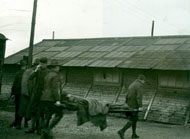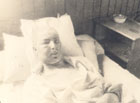In Her Words
Letter from Julia C. Stimson to her family, July 25, 1917
Rev. Henry A. Stimson, father of Base Hospital 21 chief nurse Julia C. Stimson, compiled his daughter’s letters to her family during the First World War into the book, Finding Themselves. Published in 1918 (before the end of the war), Finding Themselves tells of the experiences and gradual changes in the nurses as they “found themselves” through days and nights of unrelenting and difficult service.
During their first weeks of service in Rouen, the fairly light patient load gave Base Hospital 21 personnel time to adjust to wartime conditions. However, by the end of July 1917, the emotional and physical demands of military nursing were recognized.
July 25, 1917
I do not know how to write about our doings of the past few days, for I cannot write numbers, and it is only numbers that would give you any idea at all of what we have been doing. I wrote in my last letter, I think it was, that we were not working hard, well, we have begun our hard work, and for our own sakes we are glad of it. In the past 24 hours we have admitted more patients than the total capacity of the Barnes and Children’s Hospital, not the average number of patients, but the total capacity. And all these patients have been bathed, fed, and had their wounds dressed. Some of course were able to walk and could go to the bath house and the mess tents, but most of them to-day are stretcher cases, and oh, so dirty, hungry, and miserable. The mere (I say mere, but it is really the most important part of the whole thing) proper recording of the names, numbers, ranks, nearest relatives etc., is in itself a huge task. Of course the nurses don’t have all that to do, but they have a lot of it. The boys who are stretcher bearers must be so lame, they can hardly move, for just consider what it means to lift down out of ambulances as many patients as that, and then afterwards carry them as far sometimes as a city block, for we filled our farthest tents to-day. It is most remarkable how things have gone. There are many aching backs to-night, for all the beds are very low and the stooping is terrific, but every one has been a brick. Many of the nurses have worked 14 straight hours to-day, and many of the doctors had only two or three hours’ sleep last night, and were working all day. The difficulty to-day was, that we had to put patients into rows of tents that have not been used for some time and were not equipped, and our warning was not long enough to prepare. We had the beds ready, but little else. To-night things have straightened out a lot, but it is going to be a busy night as we are to send out a convoy, and get another in. Three additional night nurses are on to-night, taken from the day force that has to stretch itself a little thinner.
. . . We have been receiving patients that have been gassed, and burned in a most mysterious way. Their clothing is not burned at all, but they have bad burns on their bodies, on parts that are covered by clothing. The doctors think it has been done by some chemical that gets its full action on the skin after it is moist, and when the men sweat, it is in these places that are the most moist that the burns are the worst. The Germans have been using a kind of oil in bombs, the men say it is oil of mustard. These bombs explode and the men’s eyes, noses, and throats are so irritated they do not detect the poison gas fumes that come from the bombs that follow these oil ones, and so they either inhale it and die like flies, or have a delayed action and are affected by it terribly several hours later. We have had a lot of these delayed-action gassed men, who cough and cough continuously, like children with whooping cough. We had a very bad case the other night who had not slept one hour for four nights or days, and whose coughing paroxysms came every minute and a half by the clock. When finally the nurses got him to sleep, after rigging up a croup tent over him so that he could breathe steam from a croupkettle over a little stove that literally had to be held in the hands to make it burn properly, they said they were ready to get down on their knees in gratitude, his anguish had been so terrible to watch. They said they could not wish the Germans any greater unhappiness than to have them have to witness the sufferings of a man like that and know that they had been the cause of it. It is diabolical the things they do, simply fiendish, and like the things that would be expected from precocious degenerates.
I cannot imagine what kind of change is going to take place in our minds before we get home. There are so many changes coming over our ideas every day. They are not new ideas, for many people have had them before, since the beginning of this war, but they are new to us. Human life seems so insignificant, and individuals are so unimportant. No one over here thinks in any numbers less than 50 or 100, and what can the serious condition of Private John Brown of something or other, Something Street, Birmingham, matter? One’s mind is torn between the extremes of such feelings, for when a nurse takes the pulse of a wounded sleeping man and he wakes just enough to say “Mother,” she goes to pieces in her heart, just as though he weren’t only one of the hundreds of wounded men in just this one hospital. . . .
But what will we think when we get through with it all? How are we going to stand the mental strain? Yet others do, and go on being normal, cheerful human beings, teaching bayoneting one hour, and playing tennis the next, or having tea with pretty nurses. Oh, it’s a queer world! as the orderly said who came to tell me of a few more hundred wounded expected in soon. “Isn’t it a cruel world?”
Next letter from Julia Stimson to her family (Aug. 8, 1917)>>
Return to Letters & Memos (In Her Words)
Return to In Her Words
Back to Top


